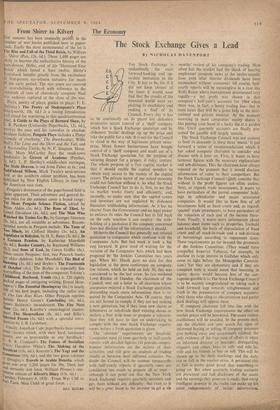From Shirer to Kilvert
HE summer has been unusually prolik in the umber of war books published here in paper- ack, Easily the most monumental of the lot is he Rise and Fall of the Third Reich, by William . Shirer (Pan, 12s. 6d.). These 1,400 pages are tkely to become the authoritative history of the an/demon, Hitler, and of his Thousand-Year eich' which lasted a bare twelve. Shirer's otenbuch benefits greatly from the excitement f first-person eye-witness narrative for much I the early period. The war years are covered
n overwhelming detail with reference to the undreds of tons of obsessively complete Nazi ar archives captured at the close of the war.
rk, Plays, poetry of plays, guides to plays: F. E. lalliday's The Poetry of Shakespeare's Plays buckworth, 10s. 6d.) is a loving introduction h ell timed for reprinting in this quadricentennial Year; A Guide to the Plays of Bernard Shaw, by C. B. Purdom (University Paperbacks, 12s. 6d.), itrveys the man and his comedies in absolute cdeadpan fashion; Penguin Plays includes a Pinter comedy of overhang,' The Dumbwaiter, Willis }lairs, The Long and the Short and the Tall, and .1 Resounding Tinkle, by N. F. Simpson. Mean- hile, Mary McCarthy flays the small-town teademics in Groves of Academe (Panther, 3s. 6d.); L. P. Hartley's middle-class meringue, be Sixth Heaven, is out from Faber at 6s.; and Pudd'nhead Wilson, Mark Twain's semi-serious look at the southern colour problem, has been Published by New English Library in time for the American race riots.
Penguin's dominance of the paperbound field is again apparent. Their adventure and general fic- tion titles for the summer cover a broad range : Yet More Penguin Science Fiction, edited by flan Aldiss (3s. 6d.); The Rose of Tibet, by Lionel Davidson (4s. 6d.); and The Man Who Watched the Trains Go By, by Georges Simenon (s. 6(1.), are all readable as adventure. Recom- !nended novels in Penguin include: The Taste of too Much, by Clifford Hanley (3s. 6d.); An Aspidistra in Babylon, by H. E. Bates (3s. 6d.); In o German Pension, by Katherine Mansfield (3S. 6d.); Border Country, by Raymond Williams (Ss.); and Sons of God, by Gwyn Griffin (4s.). Other recent Penguins: first, two Peacock books for older children: John Masefield's The Bird of bawning (3s. 6d.) and Bryher's The Fourteenth of October (4s.). The Bryher is especially fine storytelling of the time of the conquerOr. Tolstdy's Childhood, Boyhood, Youth (6s.) is 320 tightly packed pages of intriguing writing; Ernest Hem- 4Igway's The Essential Hemingway (6s.) is nearly S°0 of his best pages, including the entire text ef The Sun Also Rises. Other Penguin reprints include Henry Green's Concluding (4s. 6d.), james Baldwin's incandescent The Fire Next 'me (2s. 6d.), Koestler's cosmological master- Piece The Sleepwalkers (8s. 6d.) and Rilke's Selected Poems (3s. 6d.) with a splendid intro- duction by J. B. Leishman.
Finally, Jonathan Cape paperbacks have issued some classics which, with their hard, laminated eovers, are as presentable as any hardback :
A. R. Crosland's The Future of Socialism Theodore White's The Making of the President (I 3s, 6d.), Koestler's The Yogi and the Commissar (10s. 6d.), and the two great volumes (),! boughty's Travels in Arabia Deserta, which 'oyes one over 1,200 pages for 50s. Then, last .4nd certainly not least, William Plomer's one- volume edition of Kilveit's Diary (13s. 6d.)- . . 1.puesdaY, February 8, 1870: 'From Wye Cliff to °rt Faen. Miss Child in great force. . .
. BILL BUILER






































 Previous page
Previous page